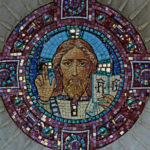We run our website the way we wished the whole internet worked: we provide high quality original content with no ads. We are funded solely by your direct support. Please consider supporting this project.

The Centrality of the Cross in Church History
Some readers of Crucifixion of the Warrior God may be assuming that the emphasis I’m placing on the cross is unprecedented in church history. While I will not deny that the cross-centered approached to interpreting Scripture’s violent divine portraits is new, the fact that I’m placing the cross at the center of my understanding of Christ, and therefore of all Scripture, is most certainly not. In truth, I believe I am simply striving to work out the implications of what many Protestants and especially Evangelicals have claimed to believe.
A good place to begin is with Luther. His famous theologia crucis not only forms the heart of his theology, but it, in various ways and to various degrees, plays a central role in the faith of all the other Protestant Reformers. Hence, for example, Calvin proclaimed: “In the cross of Christ, as in a splendid theater, the incomparable goodness of God is set before the whole world. The glory of God shines … never more brightly than in the cross.”[1] This is simply another way of saying that the cross is the quintessential revelation of God.
Moreover, given that I am writing out of an Evangelical tradition, it is important to note that “crucicentrism” has been a central defining feature of evangelicalism from the start. Indeed, in the 19th century William Gladstone argued that the Evangelical movement was essentially a God-inspired movement that was focused on “bringing back … the Cross, and all that the Cross essentially implies,” at a time when the Reformation’s emphasis on the centrality of the cross was being compromised.[2]
John Wesley reflected the crucicentric orientation of the early Evangelical movement when he wrote that no aspect of the Christian faith “is of greater consequence than the doctrine of the Atonement.” It was, in fact, “the distinguishing point between Deism and Christianity.”[3] So too, an early 19th century Methodist manual for clerics expressed the commonly held view among Methodists of the time when it went so far as to state that “the whole Christian system” is encompassed by “the death of Christ.”[4] A clearer statement on the cross as the thematic center of everything Jesus was about, and everything the movement he inaugurated was about, is hard to imagine.
We see the thematic centrality of the cross being expressed just as forcefully, and explicitly in relation to the Incarnation, toward the end of the 19th century. In the Bampton Lectures of 1891, Christian Gore inaugurated what was to quickly become a tradition among Anglican theologians when he placed the Incarnation at the center of Christian theology.[5] The Methodists responded the following year with a strong warning.
We rejoice in the prominence which is being given to the doctrine of the Incarnation, with all its solemn lessons and inspirations. But we must be careful lest the Cross passes into the background, from which it is the glory of our fathers to have drawn it. Give to the death of Christ its true place in your own experience and in your Christian work — as a witness to the real and profound evil of sin, as an overwhelming manifestation of Divine love, as the ground of acceptance with God, as a pattern of sacrifice to disturb us when life is too easy, to inspire and console us when life is hard, and as the only effectual appeal to the general heart of men, and, above all, as the Atonement for our sins.[6]
The church historian David Bebbington is on the mark when he notes that this forceful response indicates that for these 19th century Evangelicals, “[t]o make any theme other than the cross the fulcrum of a theological system was to take a step away from Evangelicalism.”[7] To this I would simply add that, as with the above cited early 19th century manual for clerics, it’s hard to imagine a more forceful statement on the cross as the thematic center of everything Jesus and his Church is about.
It’s also interesting to note that, while the tendency to centralize the Incarnation caught on among Anglicans, Anglican Evangelicals resisted it. For example, in 1939 an Anglican Evangelical named Christopher Chavasse implored his Anglican colleagues to “keep close to Scripture” and, he added that sticking close to Scripture means they must “allow the Atonement to explain the Incarnation…”[8]
It is clear that Evangelicals from the 18th to the early 20th century were not trying to say that the Incarnation or any other aspect of Jesus’ mission was unimportant. But it’s just as evident that the Incarnation and everything Jesus was about needed to be understood in light of the cross.
[1] J. Calvin, Commentary on John 13:31.
[2] W. E. Gladstone, “The Evangelical Movement: Its parentage, Progress, and Issue,” Gleanings from Past Years, Vol. 7, 207
[3] J. Wesley to Mary Bishop, 7 February 1778, The Letters of the Rev. John Welsey, ed. J. Telford, Vol. 6, 297.
[4] C. Bridges, The Christian Ministry, 320.
[5] C. Gore, The Incarnation of the Son of God, 125.
[6] “Annual Address to the Methodist Societies,” Minutes of Several Conversations …of the People Called Methodists 374-75.
[7] D. W. Bebbington, Evangelicalism in Modern Britain, 15.
[8] The Record, 13 January, 1939, 26.
Photo credit: Leo Reynolds via VisualHunt / CC BY-NC-SA
Category: General
Tags: Calvinism, Cruciform Theology, Evangelicalism, Luther
Topics: Atonement and The Cross
Related Reading

Podcast: If the Biblical Prophecies are Flawed, Aren’t Those Prophets ALL False Prophets?
If you want to hear Greg sweat, listen to him work through this really really good question. http://traffic.libsyn.com/askgregboyd/Episode_0200.mp3 Photo by Rex Boggs

Jesus, the Word of God
“[T]he standing message of the Fathers to the Church Universal,” writes Georges Florovsky, was that “Christ Jesus is the Alpha and Omega of the Scriptures both the climax and the knot of the Bible.”[1] It was also unquestionably one of the most foundational theological assumptions of Luther and Calvin as well as other Reformers. Hence,…

Did God Give Violent Laws? A Response to Paul Copan (#13)
In his critique of Crucifixion of the Warrior God (CWG) at the Evangelical Theological Society annual meeting in November, Paul Copan takes issue with my contention that the violent dimension of OT laws reflects God accommodating the fallen and culturally conditioned perspectives of his people at this time. In my view, God was stooping to…

Free Will: What about “natural” evil? Was Hurricane Sandy a Free Agent?
What about natural evil? How does free will help to make sense of this? Greg reflects on the origins of sickness, natural disaster, animal suffering and so on. Hope you’re enjoying the series so far. There’s more to come!

One Word
While I’ve lately been pretty distracted finishing up Benefit of the Doubt (Baker, 2013), my goal is to sprinkle in posts that comment on the distinctive commitments of ReKnew a couple of times a week. I’m presently sharing some thoughts on the second conviction of ReKnew, which is that Jesus Christ is the full and…

A Response to “Are Greg Boyd and I Reading the Same Old Testament?”
Collin Cornell has recently published a review of Cross Vision (CV) and, less directly, of Crucifixion of the Warrior God (CWG) in The Christian Century. In this post I will respond to the two major objections Cornell raises against these books. Cornell begins by recounting a discussion I had with a woman who was deeply impacted…
